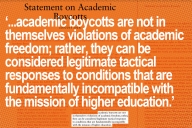You have /5 articles left.
Sign up for a free account or log in.
It’s been nearly three decades since teenagers known as the Central Park Five were convicted for a rape they didn’t commit, nearly two decades since their sentences were vacated and five years since New York City settled with them for $41 million. But the fallout from that case -- recently retold in a Netflix series by director Ava DuVernay -- continues, with implications for academe.
Most recently, this week, Elizabeth Lederer, lead prosecutor in the case, resigned from teaching law as an adjunct at Columbia University. Gillian Lester, dean of law, announced Lederer’s departure in an email to the school that included a quote from Lederer. She said she enjoyed teaching at Columbia and interacting with its many fine students, but that the “nature of the recent publicity generated by the Netflix portrayal of the Central Park case” makes it “best for me not to renew my teaching application.”
Lester, the dean, wrote that the miniseries, When They See Us, released May 31, has “reignited a painful -- and vital -- national conversation about race, identity and criminal justice.” She said she is “deeply committed to fostering a learning environment that furthers this important and ongoing dialogue, one that draws upon the lived experiences of all members of our community and actively confronts the most difficult issues of our time.”
Noting that she’d convened a special committee on diversity and inclusion last year, Lester also thanked the Black Law Students Association for its recent input on those ongoing goals.
Lester was presumably referring to a letter from the Black Law Students Association released Tuesday calling for Lederer’s termination. The "lives of these five boys were forever changed as a result" of her conduct, the letter says. Students, it notes, have previously pushed for Lederer’s termination, including following a 2012 documentary about the case co-produced by Ken Burns, to no effect. (At the time, Columbia reportedly removed a reference to the Central Park Five case from Lederer's online biography.)
A day later, Lester announced that Lederer told her she’d decided not to seek reappointment. University officials did not respond to requests for comment about the terms of Lederer’s departure, nor did Lederer. She has not publicly commented on the Netflix series or her role in the case.
Lederer still has her day job as a prosecutor with the New York County district attorney's office. But her departure from Columbia is surprising, not only because the case is decades old but because the institution has a particular reputation for welcoming controversial speakers and scholars. It was there in 2007, for example, that then president Mahmoud Ahmadinejad of Iran proclaimed there were no gay Iranians and expressed doubt about the Holocaust and Sept. 11. Columbia president Lee C. Bollinger introduced him as a “petty and cruel dictator” but said “this event has nothing whatsoever to do with any rights of the speaker but only with our rights to listen and speak. We do it for ourselves.”
Still, teaching law is very different from visiting a campus to speak, as many of Lederer’s critics have argued.
Elie Mystal, a writer for Above the Law, said there that if Lederer "had reckoned with her mistakes and apologized for them, I could see an argument for keeping her on as a lecturer. After all, lawyers are going to make mistakes. They’re going to pursue the wrong leads. They’re going to defend the wrong people or prosecute the wrong people. How they ethically deal with their bad calls is at least as important as how they make the good calls." Yet it appears "she’s unable or unwilling to do that," he wrote, and Columbia "should not be teaching their students that being a lawyer means never having to say you’re sorry."
Last week, Linda Fairstein, another prosecutor in the case -- who is portrayed even more negatively than Lederer in the series -- resigned from Vassar College's governing board. Similar to Columbia, Vassar faced pressure to end its relationship with Fairstein following the series’ release. Fairstein writes crime novels and was also dropped by her publisher.
Vassar's president, Elizabeth H. Bradley, said in a statement, "I am told that Ms. Fairstein felt that, given the recent widespread debate over her role in the Central Park case, she believed that her continuing as a board member would be harmful to Vassar."
Recent days have “underscored how the history of racial and ethnic tensions in this country continue to deeply influence us today, and in ways that change over time,” Bradley also said. “As I have received many emails and phone calls from people who have expressed a broad range of views on this issue, I am reminded of William Faulkner’s quote ‘The past is never dead. It’s not even past.’”
Unlike Lederer, Fairstein has spoken out against the Netflix series. In an op-ed this week in The Wall Street Journal, she said it "attempts to portray me as an overzealous prosecutor and a bigot, the police as incompetent or worse, and the five suspects as innocent of all charges against them. None of this is true."
Some of the teenagers admitted to other, lesser crimes committed in the park that night in 1989. But DNA evidence now makes clear that they did not rape the jogger whose story preoccupied the city and the country at the time. Then New York City resident Donald Trump was among the teens' most vocal critics, even taking out a full-page newspaper ad to call for their execution.
Of the backlash against the series, DuVernay tweeted, “Expected and typical. Onward.”
While Columbia and Vassar say that Lederer and Fairstein, respectively, quit, Harvard University last month announced that it would not renew a deanship for law professor Ronald S. Sullivan Jr., who had been leading one of the university's residential colleges with his wife. Sullivan has been praised for his work for those who have been unfairly incarcerated. But some began to call for his ouster after he joined Harvey Weinstein's defense team.
Harvard attributed its decision to unspecified "climate" issues in the residential college, but some continue to suspect that Sullivan's affiliation with the accused sexual predator is to blame. Harvard has in turn been criticized for appearing to defer to student demands that brush up against the constitutional right to a fair defense.
Michael Olivas, professor of law at the University of Houston and former general counsel for the American Association of University Professors, said he found When They See Us so tough to watch that he couldn’t finish it. But he said he didn’t believe that Lederer’s actions disqualified her as a teacher. He also said that it didn’t appear that her academic freedom had been violated, since she’s a contingent academic who left of her own accord.









